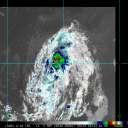Show Selection:
|
#901603 (Received by flhurricane at: 10:41 PM 05.Sep.2017)
TCDAT1
Hurricane Irma Discussion Number 28
NWS National Hurricane Center Miami FL AL112017
1100 PM AST Tue Sep 05 2017
The satellite view of Irma remains quite spectacular, with an
extremely well-defined eye and a large, symmetrical CDO. Reports
from NOAA and Air Force Hurricane Hunter aircraft indicate that the
central pressure had fallen at about 1 mb per hour since this
morning, although very recently the deepening trend has leveled
off. Based on SFMR-observed winds from the aircraft, the current
intensity remains at 160 kt. The Meteo-France radar imagery
suggests a concentric eyewall structure and observations from the
aircraft hinted at a secondary wind maximum. If an eyewall
replacement becomes more definitive, this would likely halt
additional strengthening, and could even lead to some weakening.
The official intensity forecast is near or above the model
consensus. Given the favorable atmospheric and oceanic environment,
Irma is likely to remain a Category 4 or 5 hurricane for the next
few days.
Latest center fixes from satellite imagery and the aircraft
indicate that Irma is now moving west-northwestward, or 285/13 kt.
A strong ridge extending southwestward from the central Atlantic is
expected to steer Irma west-northwestward during the next couple of
days. A large mid-latitude trough over the eastern United States is
forecast to lift northeastward, allowing the ridge to build westward
and keep Irma on a westward to west-northwestward heading through
Friday. In 4 to 5 days, a small trough diving southward over
the east-central U.S. is expected to weaken the western portion of
the ridge, causing Irma to turn poleward. Some of the dynamical
models have shifted northward a bit from the previous cycle, with
the normally reliable GFS looking like a northeast outlier. The
official track forecast leans toward the ECMWF solution. Users are
reminded to not focus on the exact forecast track, especially at the
longer ranges, since the average NHC track errors are about 175 and
225 statute miles at days 4 and 5, respectively.
KEY MESSAGES:
1. Irma is a potentially catastrophic category 5 hurricane and will
bring life-threatening wind, storm surge, and rainfall hazards to
portions of the northern Leeward Islands, including the Virgin
Islands and Puerto Rico, on Wednesday. Preparations should be
rushed to completion.
2. A Hurricane Warning is in effect for the northern coast of the
Dominican Republic, with hurricane watches for Haiti, the
southeastern Bahamas and the Turks and Caicos. Irma is likely to
bring dangerous wind, storm surge, and rainfall to these areas from
Wednesday night through Friday.
3. Irma could directly affect the remainder of the Bahamas and Cuba
as an extremely dangerous major hurricane later this week. Residents
in these areas should monitor the progress of Irma and listen to
advice given by officials.
4. The chance of direct impacts from Irma beginning later this week
and this weekend from wind, storm surge, and rainfall continues to
increase in the Florida Keys and portions of the Florida Peninsula.
However, it is too soon to specify the timing and magnitude of these
impacts.
FORECAST POSITIONS AND MAX WINDS
INIT 06/0300Z 17.4N 61.1W 160 KT 185 MPH
12H 06/1200Z 18.1N 63.1W 155 KT 180 MPH
24H 07/0000Z 19.1N 65.9W 150 KT 175 MPH
36H 07/1200Z 20.1N 68.5W 145 KT 165 MPH
48H 08/0000Z 21.0N 71.2W 140 KT 160 MPH
72H 09/0000Z 22.0N 76.2W 135 KT 155 MPH
96H 10/0000Z 23.2N 79.5W 125 KT 145 MPH
120H 11/0000Z 25.0N 81.5W 120 KT 140 MPH
$$
Forecaster Pasch |



